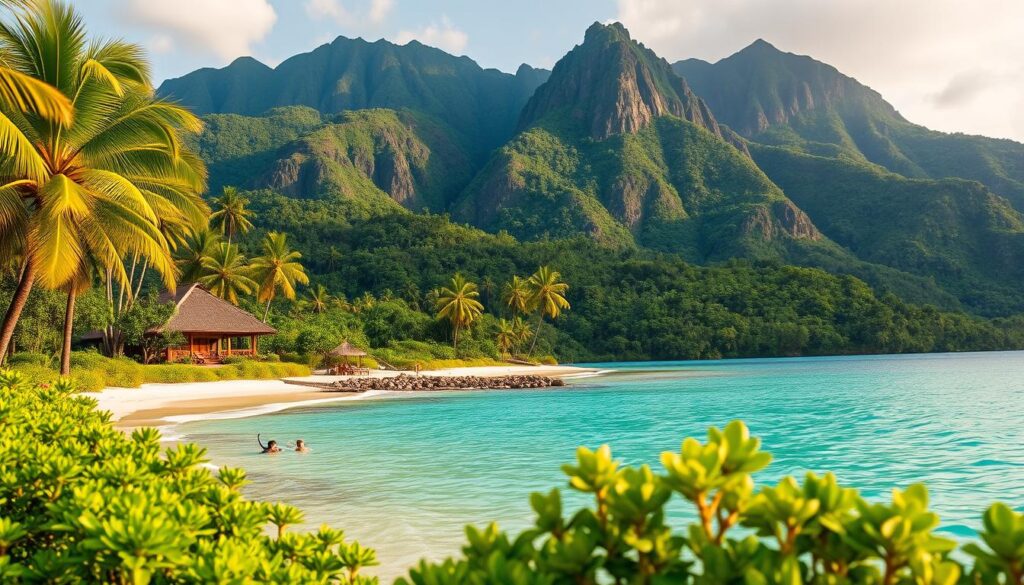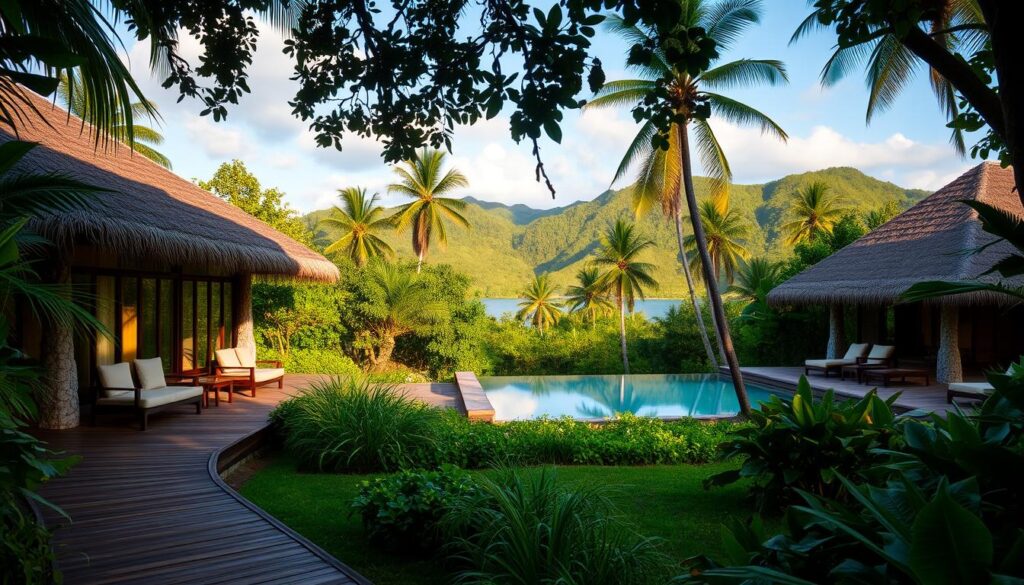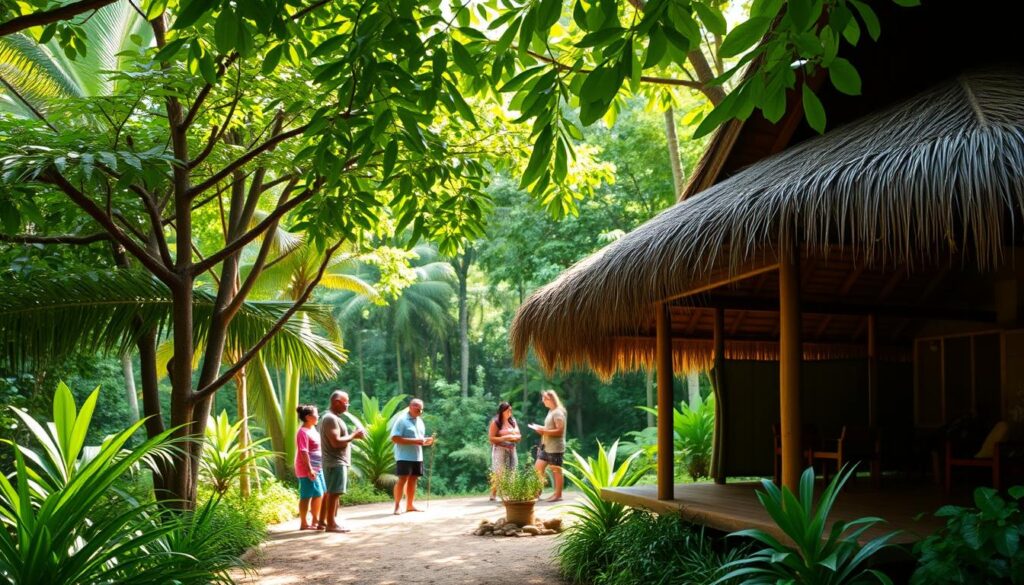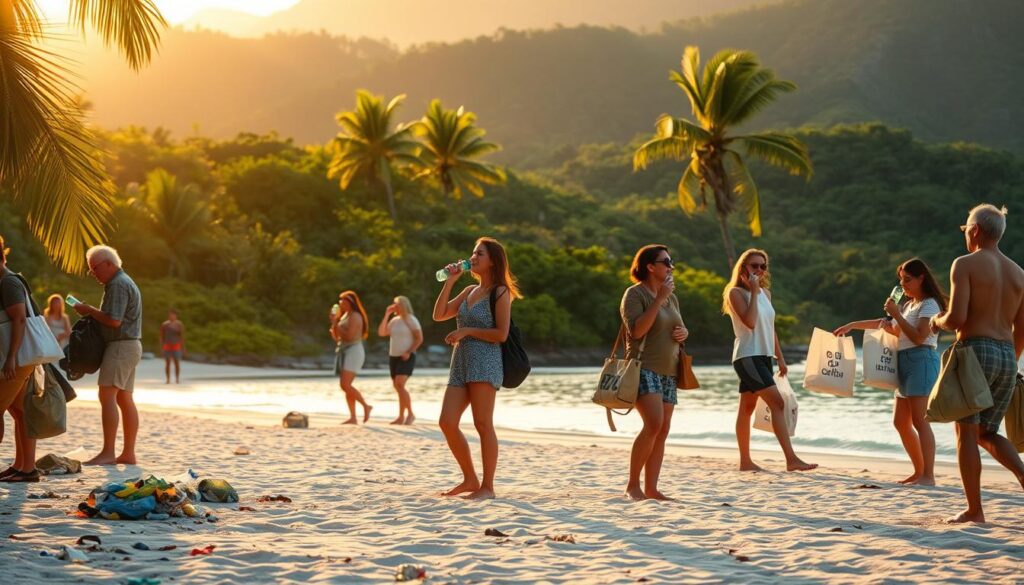Did you know that over 80% of Vanuatu’s people live sustainably through farming and fishing? This shows how important eco-tourism is in Vanuatu. The country’s beautiful landscapes and lively cultures face challenges from climate change and too many tourists.
As a traveler, your choices can really help this special place. By choosing eco-friendly places to stay and connecting with locals, you help protect Vanuatu’s nature and culture. This article will show you how to travel responsibly and why Vanuatu is a top choice for those who care about the planet.
Key Takeaways
- Eco-tourism in Vanuatu emphasizes sustainable practices beneficial to local communities.
- You can enjoy sustainable stays by selecting eco-friendly accommodations.
- Engaging with the local culture enriches your travel experience.
- Responsible travel helps mitigate the adverse effects of climate change.
- Vanuatu eco-tourism offers unique opportunities for meaningful conservation efforts.
- Supporting local artisans strengthens the economy and promotes cultural heritage.
The Importance of Eco-Tourism in Vanuatu
Eco-tourism in Vanuatu is key for saving the environment and helping communities. The islands face big challenges from climate change. Eco-tourism lets visitors see Vanuatu’s beauty while keeping it safe.
Choosing eco-tourism helps local people too. It supports local businesses and cultural projects. You get to have real experiences that help the planet and learn about conservation.

By supporting eco-tourism, you help keep Vanuatu special for the future. Together, we can make sure the next generations enjoy its beauty without harming it.
Understanding Responsible Travel Principles
To travel responsibly in Vanuatu, focus on sustainability and respect for local cultures. Ethical tourism means avoiding harm and disrespect. It’s about reducing your environmental footprint, cutting down on plastic, and saving resources.
Getting involved in cultural activities can make your trip more meaningful. It’s important to do so with respect. This way, you learn and grow while showing respect for the place and its people.
Learning about local customs is key to respectful interactions. This knowledge improves your experience and helps build strong bonds with the community. By following these principles, you support eco-friendly tourism. This approach makes travel better for everyone involved.
Eco-Friendly Accommodations in Vanuatu
Choosing eco-friendly accommodations is key to responsible travel in Vanuatu. These places focus on being green and support local economies. They offer a chance to dive into local culture and enjoy nature.
Benefits of Staying at Eco-Friendly Lodging
Staying in sustainable places helps reduce your carbon footprint. These places use:
- Renewable energy like solar and wind.
- Local, organic food to cut down on food miles.
- Composting and recycling to reduce waste.
Choosing these places helps protect Vanuatu’s stunning landscapes and ecosystems.
Examples of Green Accommodations in Vanuatu
Vanuatu has many eco-friendly spots that offer real experiences. Here are a few:
| Accommodation Name | Location | Sustainability Features |
|---|---|---|
| Eratap Beach Resort | Efate Island | Uses solar energy, sources locally, and saves water. |
| Tanna Eco-Village | Tanna Island | Focuses on community tourism and organic farming. |
| Lomani Island Resort | Malekula Island | Emphasizes local culture and green practices. |

Staying in these places reduces your environmental impact. It also connects you with the local community and nature, making your trip unforgettable.
Eco-Tourism in Vanuatu: Sustainable Stays & Responsible Travel
Traveling in Vanuatu lets you dive into local cultures and support responsible tourism. You can explore villages, join craft workshops, or eat with local families. This way, your visit helps the community and keeps traditions alive.
Engaging with Local Cultures
These real experiences make your trip better and help save unique ways of life. Local communities gain from tourism, which helps protect their heritage for the future.
Conservation Initiatives Through Tourism
Eco-tourism in Vanuatu is key to saving the islands’ beauty. Activities like reef monitoring and beach clean-ups connect travelers with nature. Groups like the Vanuatu Environmental Science Society offer chances to help and see amazing sights.

Sustainable Practices for Travelers
Traveling to Vanuatu can be a chance to help the environment. By using less plastic and saving resources, you make a big difference. Your actions help keep Vanuatu beautiful and support green travel.
Reducing Plastic Use and Waste
Plastic waste harms local ecosystems. By using less plastic, you help protect Vanuatu’s marine life. Carry a reusable water bottle and bring your own bags and containers.
Many places now offer eco-friendly alternatives to plastic. This helps reduce waste and supports sustainable tourism in Vanuatu. Your travel can inspire local businesses to go green.
Conserving Water and Energy While Traveling
Water and energy conservation are key in sustainable tourism. In Vanuatu, using less water is important. Take shorter showers and do less laundry.
Choose energy-efficient ways to get around, like electric vehicles. Many hotels use solar power. These choices lower your carbon footprint and encourage eco-friendly habits.

| Practice | Impact on Environment | Suggested Actions |
|---|---|---|
| Reducing Plastic Use | Decreases ocean pollution and protects marine life | Use reusable items, foster local alternatives |
| Water Conservation | Protects freshwater resources and ecosystems | Limit shower time, avoid laundry overload |
| Energy Conservation | Lowers carbon emissions and reliance on fossil fuels | Choose eco-friendly transportation, support solar-powered lodgings |
Exploring Vanuatu’s Natural Wonders Responsibly
Vanuatu is home to stunning landscapes and diverse ecosystems. It’s a place where you can see the country’s natural beauty up close. By choosing eco-travel, you help protect this beauty for the future.
Guided hiking and nature walks are great ways to explore. You’ll learn from local guides who know the area well. This way, you can enjoy the scenery while learning about it.
Guided Hiking and Nature Walks
Guided hikes through Vanuatu’s rainforests and volcanic lands are a must. Local guides will teach you about the plants and animals you see. This makes your trip both fun and educational.
It’s important to stay on the trails. This helps keep the environment safe for everyone. Every step you take helps protect this beautiful place.
Marine Conservation Efforts and Activities
The waters around Vanuatu are full of life. Marine conservation is key here. Eco-tours that help restore coral reefs are a great way to help.
Snorkeling tours that are safe for reefs are also a good choice. Joining efforts to protect the underwater world is important. It helps ensure future generations can see these wonders too.
Community Engagement and Support
Traveling in Vanuatu lets you connect with local communities. This experience is both rewarding and enriching. By supporting local initiatives, you strengthen bonds and gain insights into different cultures.
Voluntourism Opportunities in Vanuatu
Voluntourism is a great way to help out in Vanuatu. You can join projects that help the environment and improve communities. Organizations like Vanuatu Environmental Advocacy and Legal Support (VEALS) help tourists work with locals.
This not only makes your trip better but also makes a real difference. You’ll help improve lives and contribute to positive change.
Supporting Local Artisans and Economies
Buying from local artisans is another way to give back. It gives you unique souvenirs and keeps money in the community. This supports traditional crafts and helps fund important services like education and healthcare.
Choosing local products is a key part of ethical tourism. It helps preserve Vanuatu’s culture and supports its future.
The Future of Vanuatu’s Eco-Tourism
Vanuatu is on the verge of big changes in eco-friendly travel. This is great news for both travelers and locals. The islands want to protect the environment and engage visitors in a meaningful way.
These efforts show a strong commitment to nature. It’s more than just tourism; it’s about respecting the planet.
Upcoming Eco-Friendly Travel Initiatives
The 2025 Green Passport Program is a highlight. It rewards visitors who help with conservation. Guests will get special perks and experiences that support sustainable travel.
When you visit Vanuatu, you can help the environment and local cultures. Your trip will support eco-friendly practices.
Long-Term Sustainability Goals for the Islands
Vanuatu aims to cut down on tourism’s carbon footprint. They plan to use more renewable energy. This will help the economy grow while protecting the environment.
They’re working on carbon-neutral travel and teaming up with local communities. This shows a careful approach to preserving Vanuatu’s beauty for the future.
Conclusion
Exploring Vanuatu through eco-tourism lets you see one of the world’s most beautiful archipelagos. It also helps make a positive difference. This way of traveling focuses on amazing views and helping local communities and nature.
When you dive into Vanuatu’s culture and beautiful landscapes, your actions matter a lot. Choosing eco-friendly places to stay, joining conservation efforts, and buying local goods helps a lot. It supports a system that cares for the environment and people.
Your trip is more than just fun; it’s about leaving a lasting mark of sustainability. By following eco-tourism rules, you help keep Vanuatu’s beauty alive. This way, it will remain a top choice for eco-aware travelers for years to come.
